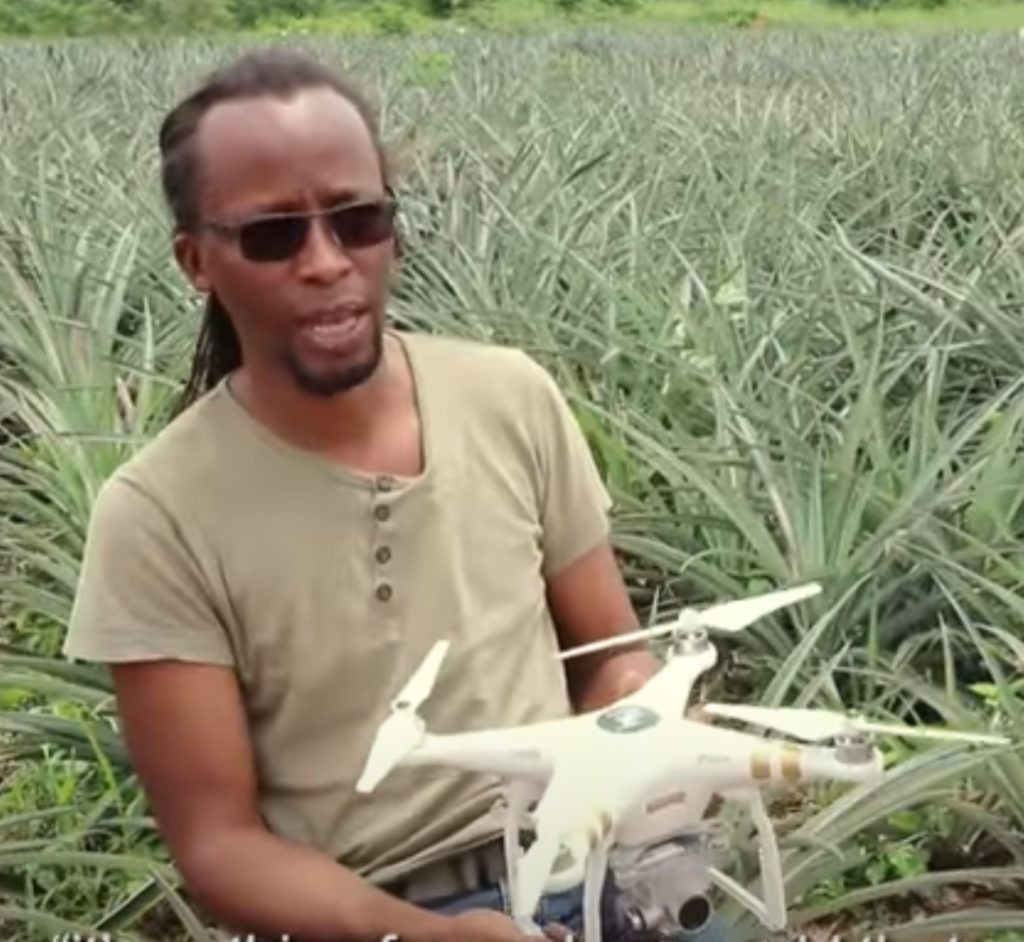
MAKING MONEY WITH DONES
In recent years, drones or unmanned aerial vehicles (UAV) are increasingly being developed and used for commercial non-military purposes. It’s very common to see drones used as toys or used to take personal photos.
These emerging technologies are not just changing the way we entertain ourselves, they are also changing the way we live. On the African continent for example, they are transforming agricultural productivity.
“I ask my friend to fly his drone over my pineapple farm and immediately I found that some pineapple were greener than others. This helped me spot and treat a fungi infection that could have cost me.”
Joshua ayinbora, CEO – GROITAL
Ghana
Joshua’s story is becoming more and more common across Africa. In fact, a whole industry is forming around drone flying. Take for example, the company named UHRULU Labs out of Tanzania. Founded by Frederick Mbuya, the company proudly lists its 6 drone pilots on its website along with its UAV services including areal mapping/surveying and agriculture. While companies like Frederick’s are making money with drone, we are still at the beginning of this revolution and there still a lot to learn.
“The good thing about flying a drone with a farmer is that they themselves can immediately identify things that they can change or improve.”
Frederick Mbuya, Founder Uhurulabs
Tazania
Just like UHURULABS, there are drone other applications African entrepreneurs are using to create businesses and jobs. One such application is the growing film and music video industry.
D’EMIPictures, a start-up with headquarters in Yaounde, Cameroon, is an example of a company taking advantage of this technology to create movies, video music, video ads, video documentaries and other entertainment related videos.

Uhurulabs, Tanzania
“Better than a simple video report, aerial photography by drone, enlightens your communication. Discovering a place in an unusual way, highlighting your heritage, or simply showing your infrastructures, we are at your side. From shooting preparation to delivery, including editing and production, we take care of everything!.”
D’EMIPictures, Yaounde
Cameroon
To show how important drones are for the company, D’EMIPictures has a top menu item named “Drone Fly” featuring multiple drone services ranging from video capture and post-production to aerial photography. The website (http://e-mediainternational.com) features a “reserve” button to book drone services.
Another innovative application emerging in African is drone delivery services. A start-up called Zipline made headlines last year for its drone delivery services used to “air-drop” vital medical supplies such as blood up to 50 miles away. This solution allows health facilities to circumvent infrastructure challenges that have often caused loss of lives. With roots in Silicon Valley and serious backing, Zipline has built a successful and scalable drone delivery business that covers a 80 km radius from the distribution centre with a payload of up to 1.75 kg. Judging from the numbers on their website (www.flyzipline.com), Zipline has successfully delivered more than 25000 packages since they were founded in 2014.
Similar effort is taking root in Ethiopia backed directly by the government. In collaboration with Zipline, the government of Ethiopia is working on drone cargo service with higher payloads of up to 5Kg. They have already done some test flights with success.

From using to building

William Elong
Founder, Drone Africa
Cameroon
In the early 2000s, African countries saw an opportunity to avoid costly investments in telephone lines infrastructure by betting on wireless telecommunication. This bet paid off with cell phone usage across the continent growing exponentially creating an entire new line of jobs and creating new services such as mobile money.
Drones are for some infrastructure what cellphone were for communication. Unlike the cellphone boom of the early 2000s, African countries are also investing into manufacturing drones.
One example is the young African entrepreneur named William Elong. In 2016, he started a project to manufacture drones locally in his country Cameroon. He successfully raised about $200,000 to advance on the project. Since then, William has secured government projects and is now looking to raise $2 Million USD to expand into other African countries and beyond. His goal is not just to build flying hardware that can take pictures, but it’s also to create the software that can leverage artificial intelligence to extract useful information for those pictures.
3 Promising drone Tech Skills
One key question we get often is “which skills set should I develop to make the most the most of this boom?”. Here are 3 tech skills that have the most potential:
- Data Science – Drone flights will provide a wealth of data from which to extract information. The ability to leverage machine learning to quickly extract useful information will be vital.
- Image Processing – drones images need to be processed and analysed to produce aerial maps, 2D and 3D maps, farming landscape and more.
- Robotics – drones are flying robots. Skilled engineers with controls and robotics knowledge will be needed to design, build, test and maintain these machines.
